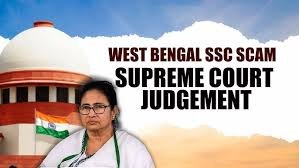The Supreme Court of India instructs the West Bengal government and State School Service Commission to publish the list of ‘unfit’ candidates from the 2016 recruitment within a week, reinforcing transparency and accountability in the tainted SSC appointment process.
New Delhi/Kolkata, August 2025 — In a decisive move for clarity and justice, the Supreme Court of India has instructed the West Bengal government and the School Service Commission (SSC) to identify and publish the names of candidates deemed ‘unfit’ or ‘tainted’ from the controversial 2016 teacher recruitment drive. This directive must be fulfilled within seven days.
Background
In April 2025, the Supreme Court had upheld the Calcutta High Court’s decision to anul the entire 2016 SSC recruitment panel, citing widespread manipulation and fraud The Times of India
The SSC, acting on judicial advice, had started sorting candidates into ‘eligible’ and ‘ineligible’ categories. This exercise involved analysis of 2.2 million OMR sheets collected by the CBI, following data recovery from the SSC’s servers The Times of India.
Current Directive
The Apex Court now mandates the state government and SSC to make public a complete list of ‘unfit’ candidates from the annulled 2016 process. This list must be published within 7 days, as a step toward transparency and to aid further legal and administrative proceedings.
Legal Developments and Reactions
- The Calcutta High Court previously ordered the SSC to bar identified tainted candidates from applying to new recruitment notification MillenniumPost+
- The WB government and SSC are appealing in the Calcutta HC Division Bench against that ruling
- Meanwhile, a group of teachers has filed a petition in HC, arguing that the fresh SSC notice violates the SC’s directive by allowing tainted candidates to apply MillenniumPost
- The HC responded sharply, noting that enabling tainted individuals would “send a harmful message of impunity to society” The Times of India.
Why This Matters
Calling out ‘unfit’ or tainted candidates marks a critical step in restoring integrity to the recruitment system. It will:
- Enable fair adjudication between honest and fraudulent candidates.
- Prevent misuse of fresh recruitment opportunities.
- Aid both legal clarity and public confidence in the system.

